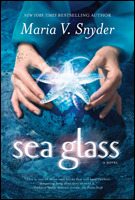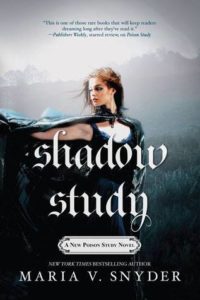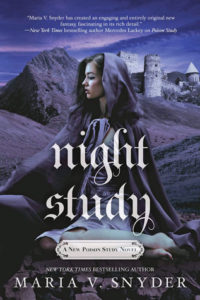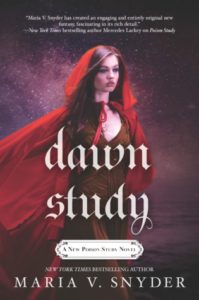I love fantasy novels, but I have a hard time sticking with a series that has more than four books, especially if they follow a single main character. What can I say; I’m a trilogy kind of girl. However, Maria V. Snyder did an excellent job of keeping me hooked all the way through the end of her nine-book series, The Chronicles of Ixia (AKA Poison Study, AKA Soulfinder—publishers really need to learn to just find one series name and stick with it). It helps that the nine books are divided into three sub-trilogies.
The first trilogy, comprised of Poison Study, Fire Study, and Magic Study, follows Yelena Zaltana. The second series, also called the Glass series, follows her friend Opal Cowan in Storm Glass, Sea Glass, and Spy Glass. The final trilogy, Shadow Study, Night Study, and Dawn Study, is where things get a bit odd. Maria V. Snyder had thrown in a few short stories/novellas throughout from different characters’ points of view. Perhaps she got bored of just sticking to one POV, or maybe fans wanted more from the other characters, so the third trilogy is from Yelena’s POV in first person and the POV’s of multiple characters (mainly Valek, Leif, and Janco, with a few others popping in from time to time) in third person.
I’m not sure which editor thought it would be a good idea to have POV switch from first person to third person in the same novel, but—yikes—is it jarring. I don’t know if the editor thought readers would be too confused because the first two trilogies were first person, but I think the entire last trilogy should have been third person. Now, I will admit my bias here—I personally always prefer third person, and I especially love third-person limited that switches between multiple characters. I think the first two trilogies in the series would have been much stronger if they had been written as such.
But enough of my rant. Because even with the wonky POV stuff in the third trilogy, these books are amazing and absolutely worth your time to read. Snyder’s world-building is compelling, detailed, and original. The books take place mostly between two pre-industrial countries: Ixia and Sitia. Ixia is a post-revolution country ruled by Commander Ambrose. His personal body guard and assassin is Valek. In the first novel Yelena is in prison for murder and is offered the choice to be the Commander’s food taster in exchange for her life. She agrees, and throughout the first book she and Valek begin to fall in love.
Ixia reminded me a lot of Communist Russia or China. In its attempts to throw away the corrupt government and society that came before, it has also thrown out all culture in the process. The country has been re-divided into districts with numbers instead of names, everyone is forced to wear a uniform, all art and extravagance has been destroyed, people have to have passes to travel between districts, and magic is forbidden. Anyone born with it is killed (or so the reader is led to believe). But Maria V. Snyder does a wonderful job of showing the good with the bad in this totalitarian dictatorship. Everyone has a job and nobody goes hungry, women are now equal to men, and violence and sexual assault are intolerable. This is why Yelena ends up in prison in the first place: she murdered the man that raped her. Now, this is probably my first major gripe with the series. We learn that Commander Ambrose loathes sexual assault and will execute anyone found guilty of it, but apparently killing a rapist in self-defense is also an executable offense. And all of that being said, Ambrose still has his own personal assassin. It all feels a bit contradictory, but again, that’s what I like about this series: it does an excellent job of peeling back the layers of her fictional societies and pointing out that governments and people in power tend to be hypocritical.
Now, the series name (or rather one of them) is Chronicles of Ixia, but honestly, it should have been called Chronicles of Sitia, because that is where most of the story takes place and is by far the more interesting and vibrant country. Sitia is part jungle, part desert, and full of magic. The peoples are divided into multiple clans or tribes that are all unique and compelling. In the second book, Yelena flees to Sitia after the Commander learns she has magic, and there she finds the family she was kidnapped from as a small child. They are part of the Zaltana clan, a group of people that live high in the trees in the jungle. Whenever I read about them, I would have to remind myself that they were not wood elves or dryads, because while there is magic in these books, there are no fantastical creatures: all characters are human or animal.
Another fascinating tribe is the Sandseeds, a group of nomads in the desert known for two major things: breeding super smart horses and having Storyweavers. The Storyweavers are people who have the magical ability to see the future and guide others, but who have to do it really cryptically because reasons (I appreciate that this gets pointed out by an annoyed Yelena multiple times). And of course, the Sandseed horses are fantastic; they choose their rider and able to mentally communicate with magical people. They even have their own horse names for people that they like.
Besides the different clans throughout Sitia, there is also the capitol, the Citadel, which is home to the magic school and the Sitian Council. While very different from Ixia, Sitia is by no means perfect. Its Council epitomizes everything annoying and dysfunctional about a bureaucracy. While the council members are elected and come from every clan in Sitia, they are at best useless and at worst actively impede the main characters.
The magic school is interesting, though the story doesn’t actually spend much time there. I like how magic was done in this series: it usually runs in families, most people with it have control over one or two things (ie. fire, mind-control, telepathy, etc.), but those who have the ability to master more can become Master Magicians after enduring a daunting trial. Magic is bound in people’s blood, so blood magic is a thing and is obviously bad, and magic (and a person’s soul) can be stolen using an intricate and gruesome blood ritual that involves prolonged torture, rape, and then murder.
Now, this is another area that I felt iffy about while reading these books. I will say right now, if rape is a trigger for you then you might not want to read them, because Snyder does not shy away from it. In fact, I almost felt like the series toed the line with the “rape as plot” trope from time to time. I also don’t love the idea of someone’s soul being able to be stolen—through magical means or otherwise—because I feel like that undermines the whole concept of the soul. But Yelena is the Soulfinder, and her magical ability is about finding lost and trapped souls and releasing them so they can move on, so at least there is an in-universe explanation for soul-stealing being a thing.
The power blanket is another interesting concept used in this series. Essentially is resides over the entire world and is the essence of magic, so magicians can pull from it to augment their own magic. However, if they pull too much and lose control, they can flame out, killing themselves and temporarily damaging the blanket in the process. I thought this was a good literary tool to prevent magical characters from being too OP (at least most of the time).
I especially like the romantic relationships in this series. Valek and Yelena are of course the main couple. In the first book they fall in love, in the second book they get separated, and throughout the series they regularly cross paths and save one another. I especially love when an author can write a romantic relationship that grows and develops as the books progress. It seems that most of our media has romantic relationships being established right at the end of the book, movie, series, etc., and if there is ever a sequel, not knowing what to do with them. Oftentimes by the next book, movie, or season the characters have broken up and found new romantic relationships, or their relationship is unhappy, or one of them has to die, because most authors just don’t know how to write a good, long-term relationship. But Yelena and Valek are heartmates, and as the series progresses they both have to mature and learn how to trust one another. My biggest complaint about the romance is that all sex scenes are just fade to black, which I personally find a bit boring.
The other major romantic relationship is between Opal and Devlen. This one was a bit awkward. Opal actually goes through a couple of guys first: a stormdancer named Kade and another glassmaker named Ulrick. And I really liked that the author included this. Many people have multiple partners before finding their soulmate, and a woman who does is not a slut. Her relationship with Devlen, however . . . Well, she’s a more forgiving person than me.
You see, it turns out that Devlen is the man who kidnapped Opal a few years earlier and tortured her because he was trying to steal her magic. But he didn’t actually enjoy torturing her and never raped her, which I guess makes it better? Well, he manages to switch bodies with Ulrick and, as Ulrick, tricks Opal into dating him, then, when he’s discovered, kidnaps and tortures her (again) to gain more power. But then she steals his magic, he spends some time in prison, and the combination of the two miraculously turn him into a good guy, claiming that magic is what made him evil in the first place.
I’m going to be honest, I didn’t completely buy his redemption arc even at the end of the third book in the Glass series, but by the ninth book they’re still together and he’s on the good guys’ side, so I guess it was real. And I have definitely watched/read much worse evil asshole to boyfriend stories. At least Devlen genuinely feels guilty for the horrible things he did in the past and attempts to make up for them, and in her defense, Opal has to do a lot of soul-searching before she can find it in her to forgive and trust him, and even more before she can develop romantic feelings for him (that aren’t based on deception, anyway). Also, Ulrick becomes a huge jerk because of his newfound magical abilities, tries to kill Opal, and later gets assassinated by Valek. I appreciate what Maria V. Snyder is trying to do here, which is to teach through her storytelling how good people can become evil, and evil people can redeem themselves and be good. Their romance was uncomfortable to read, but it was supposed to be uncomfortable, because that’s how all parties involved felt.
I can’t write this review without discussing diversity and the LGBTQ+ characters in Chronicles of Ixia. While Ixia is mostly white, Sitia, where the reader spends most of the series, has a nice mix of people of color. I wish that the covers did a better job of depicting Yelena, who is supposed to be brown-skinned, but just looks white (especially for the last trilogy, where she’s a pale goth girl who appears to have aged backwards from the first trilogy despite the decade or so that has passed). But sadly, I feel that many publishers still tend to whitewash characters on covers because they think they’ll sell better.
Now, let’s talk about Commander Ambrose. Towards the end of the first book, Yelena discovers that Ambrose is a female to male trans person. This is revealed to be why Ambrose hates magicians so much: he is afraid that one of them will read his mind and then reveal his secret (which is how Yelena discovers it). After I read the first book, I was really pleased that Snyder did such a good job of depicting a trans person, as that’s really only a small part of his character, and those who know (mainly Valek and Yelena) don’t make a big deal out of it.
And then . . . we learn that there was some strange mix-up when Ambrose was born, where he was first declared to be a baby boy, then a baby girl, because it turns out his mother, who died in childbirth, attached her soul onto his so that she wouldn’t have to leave him, which changed his physical sex to female, but is why he identifies as male, as that is what he was supposed to be . . . Yeah. It’s not great. In fact, if I was trans I would probably find it a bit insulting. I really wish the author would have just left the issue of the Commander being trans alone. Yelena discovers it in the first book, she keeps it to herself because it’s nobody else’s business, the end. But by creating this weird intricate background to explain why Ambrose is trans, Snyder just kind of shoots herself in the foot.
Throughout the rest of the series, I kept hoping for some other LGBTQ+ characters to show up to redeem the blunder with Ambrose. I actually believed that Ari and Janco were a gay couple for the longest time, what with their banter and often being referred to as partners. However, if this was the author’s intention, it was never really explicitly stated, and the partner thing just seems to refer to them being partners in combat and nothing else. There is a random and forgettable side character who mentions that she is a lesbian in the last book, but it honestly just feels like that got included because either the author or publisher wanted to go, “Hey look, we have a lesbian in this book, look how modern we are!” So, as far as representation goes, I dunno . . . I feel like Maria V. Snyder created a great trans character with Ambrose and then screwed him up.
I think Snyder’s writing is strongest when it comes to intricate plots of intrigue and backstabbing. When Opal discovers that Ulrick and Devlen managed to switch bodies (once thought to be impossible) and then tries to prove it to everyone, only to have Devlen convince everyone that she is crazy because he does such a good job of fooling them, I really felt her frustration. The third trilogy did intricate intrigue the best though, with the Cartel brainwashing all of the magicians in Sitia, creating a new militaristic government, and then attempting to go to war with Ixia. And then you learn that the Commander is in on it so that he can invade and take over Sitia and rule both. Except he isn’t actually in on it, because he is also being brainwashed, and has been for years. This was one of those plots that I genuinely wondered if and how the characters would resolve it. And I actually appreciated the resolution and how the author managed to have them avoid war right in the nick of time, though it did feel a bit too tidy when none of the major good guys died (maybe I’ve been watching too much Game of Thrones).
To sum up, the Chronicles of Ixia is by no means perfect. Maria V. Snyder had a few blunders, especially in regards to Ambrose’s character and to the magic system becoming a little bit ridiculous and overpowered towards the end of the series. Some of the books tended to drag a bit in the middle, but always picked up again for the third act. Intricately woven intrigue plots are where she shines, especially in the final trilogy. But perhaps the best part of the series is the lovingly crafted, detailed, and original world.











I came looking for someone who also noticed how blatantly whitewashed the covers were. It’s honestly upsetting to me because I love this series when I was a child, but it leaves a foul taste in my mouth to enjoy the books now. It really bothers me to discover subtle racism like this that I didn’t even see at all when I was young, always reinforcing that it did probably have a subconscious effect on me. I can’t imagine Maria intended it to be this way with how she depicts the characters in her writing, but then again, she didn’t put a stop to it.
I am also completely with you about the Commander. Rereading the first book recently, I was thinking what a poignant and respectfully delicate approach Maria took writing a trans person in 2005! Now I get it though — if she really did have the two souls plot planned all along, her intentions from the beginning aren’t clear to me anymore. What I originally saw as delicacy I see now as blindness.